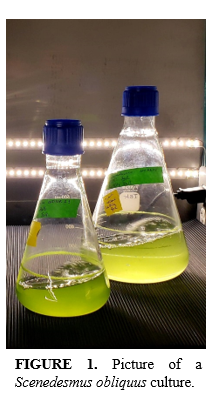EXPERIMENTAL APPROACH AND METHOD FOR ISOTOPE LABELING OF MICROALGAE BIOMASS AND RELEVANT BIOMOLECULES FOR INFLAMMATORY AND METABOLOMIC STUDIES
Stable isotope labeling is a powerful tracer approach with a wide range of applications in domains including biology, ecology, trophic dynamics, biomedical, pharmacology, drug design, nutritional, metabolomics and quantitative proteomics. There is a strong demand for biomass and biomolecules labeled with 13-carbon (13C), 15-nitrogen (15N) and (2H) deuterium. Stable isotope-labeled compounds can either be chemically synthesized or produced through metabolic incorporation using living organisms. Microalgae are well suited for this task because they can easily be cultured, have a high metabolic plasticity to environmental changes, and are able to convert inorganic compounds into organic compounds through photosynthesis. High purity isotope-labeled substrates (>95%) are needed for biomedical, pharmacology and analytical purposes but are still expensive to produce. Therefore, the optimization of microalgae culture productivity and biomass and biomolecules quality labelling (>95%) is mandatory.
Exposure to deuterium is generally associated with negative impacts on microalgae cell survival, growth and division. This project puts forth an isotope labeling method for biomass enrichment of Scenedesmus obliquus with deuterium (2H). After an acclimation period of several weeks at low concentrations of deuterium (10%, v/v), consecutive subcultures of S. obliquus were realized while gradually increasing (+10%) deuterium concentrations from 10% to 100% (v/v) in culture media. Cell survival, density and growth rate were observed and compared to a control culture. Exposed microalgae cells survived the increasing concentration of deuterium that followed the acclimation period but showed a delayed growth when compared to the control culture.
This project is part of a bigger study which aims to provide stable isotope-labeled biomolecules extracted from microalgae biomass. The isolated and purified lipids will be used to supplement human lung cell cultures in inflammatory challenge trials. Stable isotope tagging coupled with nuclear magnetic resonance (NMR) and mass spectrometry (MS) will help to understand the mobilization of active compounds during inflammatory processes symptomatic of Covid-19.
